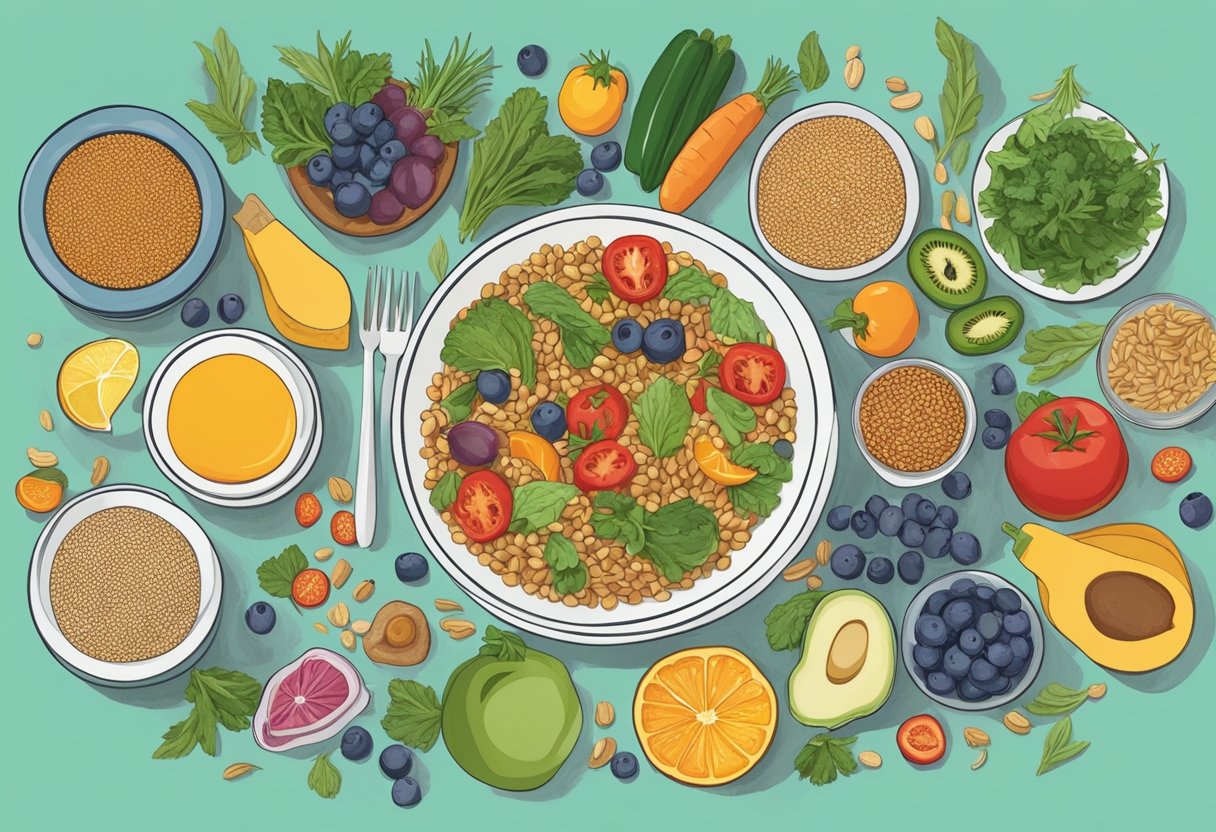Embarking on a gluten-free Mediterranean diet can serve as a rejuvenating approach to digestive health. This dietary fusion marries the benefits of a traditional Mediterranean diet—rich in healthy fats like olive oil, fruits, vegetables, and lean proteins—with the necessary restrictions of a gluten-free lifestyle, eliminating gluten-containing grains like wheat, barley, and rye. It is a harmonious blend that emphasizes whole foods and nutrient-dense options to support gut health and overall wellbeing.

The Mediterranean diet is lauded for its cardiovascular benefits, but when adapted to exclude gluten, it becomes especially advantageous for individuals with gluten sensitivity or celiac disease, offering a gut-friendly solution without sacrificing flavor or diversity in food choices. By focusing on naturally gluten-free foods common to the Mediterranean palette, one can enjoy a varied and satisfying diet that aligns with nutritional needs and lifestyle considerations.
Key Takeaways
- Merges the heart-healthy Mediterranean diet with gluten-free requirements, ensuring a diverse and nourishing meal plan.
- Prioritizes naturally gluten-free, nutrient-rich foods like fruits, vegetables, legumes, and healthy fats.
- Accommodates dietary restrictions without compromising on taste or variety, suitable for those with gluten sensitivities.
Table of Contents
Understanding Gluten and Gluten-Free Diet
In this section, we’ll examine what gluten is, how it relates to celiac disease, and the impact of a gluten-free diet on various gluten-related disorders.
Basics of Gluten and Celiac Disease
Gluten is a protein found in grains such as wheat, barley, and rye. Celiac disease is an autoimmune condition in which the ingestion of gluten leads to damage in the small intestine. People with celiac disease must adhere to a strict gluten-free diet to prevent symptoms and intestinal damage.
Gluten Sensitivity and Related Conditions
Apart from celiac disease, gluten sensitivity or non-celiac gluten sensitivity is a condition where individuals experience symptoms related to gluten ingestion, without having celiac disease. Symptoms can range from bloating and gas to fatigue and headaches. A gluten-free diet can benefit people with gluten sensitivity.
Benefits of a Gluten-Free Diet
For those with celiac disease, a gluten-free diet is essential. It can alleviate symptoms, promote intestinal healing, and reduce the risk of associated complications. Moreover, gluten-free products are more widely available now, making it easier to maintain this diet. Even outside these conditions, some people find that a gluten-free diet can improve digestion and overall wellness.
Essentials of the Mediterranean Diet
The Mediterranean diet prioritizes fresh, whole foods and includes a plethora of ingredients that are both flavorful and nutritious.
Core Components
Fruits and Vegetables: A foundation of the diet, they are consumed in abundance. Tomatoes, spinach, and eggplants are just a few examples of the colorful spectrum that’s encouraged.
Whole Grains: Integral to the diet, whole grains like quinoa and brown rice are chosen over refined grains.
Healthy Fats: Olive oil is a staple source of monounsaturated fats.
Nuts: A variety of nuts, including almonds and walnuts, offer protein and fats.
Protein: Fish, such as salmon, provides lean protein and omega-3 fatty acids.
Beans: Legumes like lentils are key sources of fiber and protein.
Meal Plan: Incorporates a diversity of these components in daily eating.
- Fruits: 2-3 servings per day
- Vegetables: 3-4 servings per day
- Whole Grains: At least 2 servings per day
- Healthy Fats: Primarily from olive oil
- Fish: At least 2 times per week
- Nuts: A handful per day
- Beans: At least twice a week
Health Benefits
They gain significant antioxidants from fruits and vegetables, which contribute to reducing inflammation. The incorporation of whole grains enhances digestive health through fiber. The preference for fish and healthy fats over red meat contributes to heart health. The overall variety within a Mediterranean meal plan supports a well-rounded diet.
Nutritional Synergy: Combining Gluten-Free and Mediterranean Diets
The Gluten-Free Mediterranean Diet merges the heart-healthy principles of the Mediterranean diet with the gluten-free lifestyle, catering to those with celiac disease or gluten sensitivity. This nutrition plan emphasizes fruits, vegetables, lean proteins, and whole grains that are naturally free of gluten.
Building a Gluten-Free Mediterranean Meal Plan
Developing a meal plan that adheres to both the gluten-free and Mediterranean dietary guidelines involves focusing on naturally gluten-free grains like quinoa and rice. A daily meal plan could include:
- Breakfast: Greek yogurt with fresh fruit and a drizzle of honey.
- Lunch: Quinoa salad with chickpeas, cucumbers, tomatoes, and feta cheese.
- Dinner: Grilled fish with a side of sautéed vegetables and brown rice.
Snacks can consist of fruits, nuts, and seeds, which are portable and require no preparation. These meal components are not only nutritious but also conducive to weight loss and provide sustained energy.
Incorporating Plant-Based Foods and Lean Proteins
A synergistic approach to diet involves an abundance of plant-based foods rich in fiber, which support digestive health and may reduce inflammation that often accompanies digestive disorders. Legumes, fruits, and leafy greens are staples. Lean proteins such as fish and poultry are key for maintaining muscle health without the gluten found in many processed meats. Recipes focused on these foods provide essential nutrients and health benefits which include cancer and heart disease prevention.
Understanding Fats and Carbohydrates
In a Gluten-Free Mediterranean Diet, it’s critical to understand the right types of fats and carbohydrates to include:
- Healthy Fats: Olive oil and avocados are encouraged, offering cardiovascular benefits.
- Carbohydrates: Focus on gluten-free choices with a low glycemic index to prevent blood sugar spikes.
This balanced approach can positively impact overall well-being, offering a sustainable and diverse diet that includes a variety of foods and flavors.
Preparation and Meal Planning
Embarking on a gluten-free Mediterranean diet involves strategic shopping and thoughtful preparation to promote digestive health. Heart health and managing conditions like diabetes can be supported by meal plans rich in whole foods and plant-based ingredients.
Shopping for Gluten-Free Mediterranean Ingredients
They should begin by creating a grocery list that emphasizes fresh, whole foods. Gluten-free staples include:
- Fruits and Vegetables: A vibrant array of produce is at the heart of the diet.
- Legumes: Beans, lentils, and chickpeas are gluten-free and rich in fiber and protein.
Additionally, shopping for heart-healthy seeds, like flax and chia, nutrient-dense nuts, and high-quality olive oil is essential. Identifying gluten-free whole grains such as quinoa and buckwheat is vital. They can also look for gluten-free labels on packaged products to ensure safety.
Meal Prep and Cooking Tips
Proper meal prep starts with organizing ingredients and outlining meals for the week. They should:
- Use glass containers to store prepped vegetables and cooked legumes.
- Prepare a large batch of a gluten-free grain at the beginning of the week.
Cooking with water or healthy fats instead of processed oils can contribute to heart health and prevent chronic diseases. Seasoning with fresh herbs and spices rather than premixed spice blends that may contain gluten provides added nutritional benefits.
Recipe Ideas and Inspiration
Individuals may explore recipes that showcase the rich flavors of the Mediterranean while being mindful of nutrition:
- Breakfast: Start the day with an omelet using cage-free eggs, spinach, and tomatoes.
- Lunch: A quinoa salad with roasted vegetables and lemon-tahini dressing.
- Dinner: Grilled fish or chicken with a side of mixed legume salad.
One can find gluten-free Mediterranean diet recipes that are diverse and satisfy various dietary requirements. They are encouraged to be creative, substituting ingredients where necessary to adhere to the gluten-free component of their diet.
Dietary Management and Food Choices
When adopting a gluten-free Mediterranean diet, individuals must pay close attention to food labels to avoid gluten and emphasize fiber-rich and gluten-free whole grains to support digestive health.
Reading Labels and Avoiding Hidden Gluten
Carefully reading food labels is crucial for individuals on a gluten-free Mediterranean diet. Gluten can be found in many products, sometimes where one might not expect it. Foods like soups, sauces, and even some flavored spices and herbs may contain gluten as a thickener or binding agent. Choose products with labels that clearly state “gluten-free” and be aware of terms that indicate hidden gluten such as “malt flavoring” or “modified food starch.” Incorporating naturally gluten-free grains like quinoa and buckwheat, along with seeds and chickpeas, can provide nutritious alternatives without the risk of gluten contamination.
The Role of Fiber and Whole Grains
Fiber plays a pivotal role in the digestive health benefits of a gluten-free Mediterranean diet. Opting for high-fiber, gluten-free grains such as rice, quinoa, and buckwheat can improve gastrointestinal function and contribute beneficial nutrients. It is important to include a variety of seeds and legumes, like chickpeas, which offer both fiber and protein, making meals not only gut-friendly but also satisfying and nutritious. Simple, whole-food choices are emphasized, avoiding processed items that often lack fiber and other essential nutrients.
Health Considerations and Diet Optimization
The Gluten-Free Mediterranean Diet merges the heart-healthy elements of the Mediterranean dietary pattern with the gluten-free lifestyle to address digestive health. It emphasizes the importance of nutrient-rich foods and proper hydration to manage and prevent chronic diseases.
Addressing Nutrient Deficiencies and Hydration
Ensuring adequate intake of essential nutrients is crucial in a Gluten-Free Mediterranean Diet. Individuals adopting this diet should focus on foods rich in omega-3 fatty acids, such as wild-caught salmon and shrimp, which can support heart health and reduce the risk of stroke. Nutrient deficiencies, particularly in iron, B vitamins, and fiber, are a concern for those on gluten-free diets; therefore, incorporating beans, legumes, and nuts can help maintain nutrient balance.
Hydration plays a pivotal role in this dietary pattern. Adequate water intake supports digestion and nutrient absorption, thus preventing the dehydration that can exacerbate digestive issues.
Key nutrients to focus on:
- Omega-3 Fatty Acids: found in seafood like salmon and shrimp
- Fiber: sourced from beans, legumes, and gluten-free whole grains
- Iron and B Vitamins: available in nuts and legumes
Hydration recommendations:
- At least 8-10 glasses of water per day
- Herbal teas and natural, flavored water can provide variety
Reducing Chronic Inflammation and Disease Risk
The diet is celebrated for reducing inflammation and the risk of chronic diseases. It does so by focusing on a variety of plant-based foods and high-quality fats. Foods that promote reduction in inflammation include fresh fruits, vegetables, and a moderate amount of nuts, all of which are foundational components of the Gluten-Free Mediterranean Diet.
Chronic diseases such as heart disease may be managed or avoided with consistent dietary habits centered around these principles. Bringing family and friends together for meals can also encourage a supportive environment for sustaining these dietary changes.
Foods to incorporate for reducing inflammation:
- Fruits and vegetables: diverse types, rich in antioxidants
- Nuts: especially almonds and walnuts, to quell inflammation
Strategies to reduce disease risk:
- Regular consumption of plant-based meals
- Including seafood with high omega-3 content weekly
Lifestyle and Social Aspects

The Gluten-Free Mediterranean diet merges nutritional benefits and social enjoyment, posing challenges yet offering flexibility in meal planning and dining experiences.
Adapting to Social Settings and Dining Out
When dining out, individuals following a Gluten-Free Mediterranean diet should focus on restaurants that offer a variety of vegetables, lean proteins, and gluten-free grains. They can often find suitable options like grilled fish, salads, and starches like potatoes. Before visiting a restaurant, reviewing the menu online or calling ahead can help to ensure that there are appropriate options available. Making the staff aware of one’s dietary restrictions upon arrival is also beneficial for a safe and enjoyable dining experience.
Involving Family and Friends in Diet Choices
Incorporating a Gluten-Free Mediterranean diet into one’s lifestyle can be smooth when family and friends are involved and informed. Creating a shared meal plan with consideration for every member’s needs makes meals inclusive and enjoyable. Introducing staple ingredients such as yogurt, cheese, and healthy fats like olive oil into the household shopping list promotes a collective dietary shift. When shopping, involve companions in selecting gluten-free and Mediterranean items, turning grocery shopping into a supportive group activity.
Common Challenges and Solutions

Transitioning to a gluten-free Mediterranean diet can be complex but manageable. Here are ways individuals can navigate common hurdles, ensuring a diverse diet and maintaining healthy weight.
Managing Dietary Restrictions with Variety
To accommodate dietary restrictions, particularly with diseases like celiac disease, variety is key. Individuals should focus on naturally gluten-free foods such as fruits, vegetables, and legumes that are staples of the Mediterranean diet. For instance, to prevent cancer and heart disease, incorporating a wide range of colorful produce can provide essential nutrients and antioxidants. Additionally, whole grains such as quinoa and brown rice are excellent gluten-free alternatives that offer both variety and nutritional benefits, potentially aiding in diabetes management.
- Explore different cuisines: Mediterranean, Middle Eastern, and Asian cuisines offer many gluten-free options.
- Think beyond wheat: Utilize ingredients like almond flour and chickpea pasta for diverse, satisfying meals.
- Combine foods creatively: Pair grilled fish or chicken with an array of vegetables and a side of quinoa for a balanced meal.
Strategies for Sustained Weight Management
The gluten-free Mediterranean diet, when properly implemented, can aid in weight loss and weight management without feeling restricted. Its emphasis on whole foods is compatible with various dietary restrictions and offers a satisfying approach to eating. For sustained weight management, it’s important to:
- Include healthy fats: Foods like olive oil and nuts can help with satiety and manage hunger.
- Portion control: While the Mediterranean diet is rich in nutrients, watching portion sizes helps prevent overeating.
- Regular exercise: Complement the diet with physical activity to strengthen the benefits for heart health and weight control.
Incorporating strategies like having smaller, more frequent meals and being mindful of calorie intake from higher-fat foods such as olives and avocados can make a significant difference. Prioritizing water and herbal teas over sugary drinks also contributes to maintaining a healthy weight without cutting corners on nutrition.
Incorporating Seasonal and Fresh Ingredients

In a gluten-free Mediterranean diet, the emphasis on seasonal and fresh ingredients aids in enhancing digestive health. These components are cornerstones of the diet, providing both flavor and nutritional benefits.
Selecting Seasonal Produce
Seasonal produce is a key element of the Mediterranean diet, and selecting these items ensures peak freshness and nutrition. Lentils, for example, can be chosen based on their harvest time to guarantee the best quality. They are an excellent gluten-free option, rich in protein and fiber, which supports a healthy gut. It’s important to know when different vegetables and fruits are in season in one’s local area to maximize their nutritive properties.
- Spring: asparagus, strawberries, peas
- Summer: tomatoes, peppers, peaches
- Fall: apples, pumpkins, kale
- Winter: citrus fruits, root vegetables, pomegranates
Benefits of Fresh Fruits and Vegetables
Fresh fruits and vegetables are staples of the gluten-free Mediterranean diet. They are not only naturally gluten-free but are also packed with vitamins, minerals, and fiber essential for good digestive health. For instance, seafood and poultry are valuable sources of lean protein and omega-3 fatty acids, which are important for maintaining a healthy intestinal lining. Fresh produce also contains antioxidants that can help reduce inflammation in the digestive tract.
- Vitamins and Minerals: Citrus fruits provide vitamin C, while leafy greens are high in iron and calcium.
- Fiber Content: Berries, apples, and legumes, such as lentils, contribute to the recommended daily fiber intake.
- Hydration: Cucumbers and watermelons have a high water content, which is beneficial for digestion.
By incorporating these fresh, seasonal items into one’s diet, individuals can enjoy the full spectrum of flavors and nutritional benefits the Mediterranean diet has to offer.
Sample Menus and Food Pairings

Adhering to a gluten-free Mediterranean diet, individuals can enjoy a variety of delicious and nutritious meals that support digestive health. Each meal presents an opportunity to combine wholesome gluten-free grains with fresh vegetables, lean proteins, and healthy fats.
Breakfast Options
- Grilled Chicken and Avocado: Start the day with a protein-rich option like thinly-sliced grilled chicken breast served with mashed avocado on gluten-free toast. Add a squeeze of lemon for zest.
- Oatmeal Reinvented: A bowl of gluten-free oatmeal topped with a dollop of almond butter and fresh berries offers a hearty, fiber-filled breakfast.
Lunch Combinations
- Tuna Salad Twist: Mix together a tuna salad with lemon juice and olive oil dressing, serve it atop a bed of mixed greens for a light yet satisfying lunch.
- Asparagus and Quinoa Salad: Combine steamed asparagus with cooked quinoa, cherry tomatoes, and crumbled feta cheese for a nutrient-dense midday meal.
Dinner Selections
- Lemon-Garlic Pasta: Toss gluten-free pasta with a vibrant sauce made from olive oil, fresh lemon juice, garlic, and chopped parsley.
- Eggs and Greens: For an easy evening meal, prepare scrambled eggs with spinach and serve alongside a portion of roasted Mediterranean vegetables.
Desserts and Snacks
On a gluten-free Mediterranean diet, one can enjoy a variety of desserts and snacks that are both healthy and satisfying. It is important to focus on natural, unprocessed foods while accommodating dietary restrictions.
Desserts:
- Fruit-based options: Fresh fruit salads with a sprinkle of chopped nuts or herbs can make for a refreshing and natural sweet treat.
- Gluten-free baking: Using gluten-free grains like almond flour or polenta, individuals can make delicious cakes and cookies. An example is the Sticky Gluten-Free Lemon Cake that uses almond flour and polenta for its base.
- Portion control is key: One can enjoy smaller portions of rich desserts, such as a slice of cake or a handful of energy balls inspired by classic desserts like tiramisu.
Snacks:
- Seeds and nuts: Snacking on seeds, like pumpkin or sunflower seeds, provides essential nutrients and are easy to incorporate into one’s diet.
- Homemade spreads: Almond butter is a nutritious choice for dipping fruit or spreading on gluten-free crackers.
- Herbs and spices: They can add flavor and health benefits to snacks without the need for excess sugar.
Individuals should experiment with gluten-free products and grains to create diverse and satisfying snacks and desserts. Being mindful of sugar intake, considering natural sweetness from fruits, and adhering to moderate portions helps maintain a healthy gut and overall wellness.
Frequently Asked Questions

Navigating a gluten-free Mediterranean diet can raise several questions about ingredients, recipe adaptations, and health benefits. These FAQs are designed to clarify common inquiries.
What types of foods are included in a gluten-free Mediterranean meal plan?
A gluten-free Mediterranean meal plan includes a variety of fruits, vegetables, lean proteins, and gluten-free whole grains. It prioritizes healthy fats like olive oil and encourages nuts, seeds, and legumes while steering clear of gluten-containing grains.
How can I adapt traditional Mediterranean recipes to be gluten-free?
Traditional Mediterranean recipes can be made gluten-free by substituting gluten-containing ingredients with alternatives such as almond flour, quinoa, or gluten-free pasta. Herbs and spices common to the region can be kept to maintain authentic flavors.
What items should I look for when creating a gluten-free Mediterranean shopping list?
When crafting a gluten-free Mediterranean shopping list, include fresh produce, gluten-free grains like brown rice and millet, and proteins such as fish and chicken. Don’t forget to list essential fats, such as avocados and nuts, which are integral to the diet.
Can adopting a gluten-free Mediterranean diet contribute to better digestive health?
Yes, a gluten-free Mediterranean diet can contribute to better digestive health by incorporating a high intake of fiber-rich vegetables and fruits, which aid digestion, and by eliminating gluten, which causes discomfort in individuals with sensitivity or celiac disease.
Which Mediterranean meals are best suited for a gluten-free and dairy-free diet?
For a gluten-free and dairy-free Mediterranean diet, meals such as grilled fish with a side of quinoa tabbouleh, roasted vegetables, and hummus made without tahini are good choices as they avoid both gluten and dairy.
Where can I find gluten-free options at Mediterranean restaurants?
Mediterranean restaurants often offer naturally gluten-free options such as rice dishes, grilled meats, and salads. Always inquire about ingredients and cross-contamination with staff to ensure meals meet gluten-free standards.



